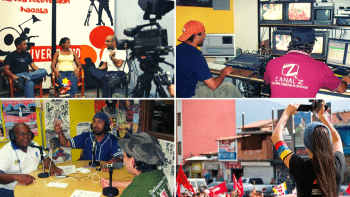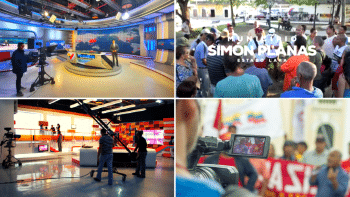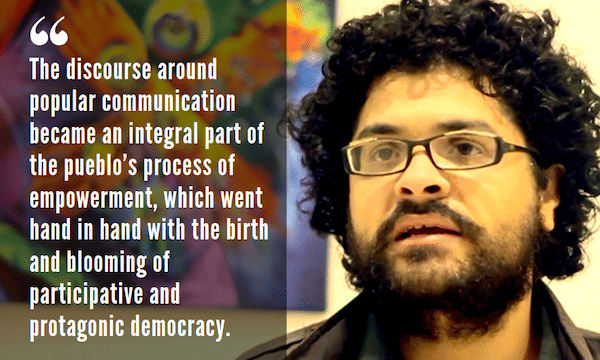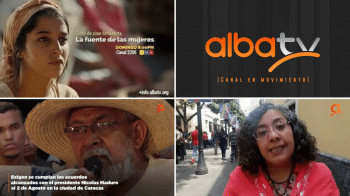An Uruguayan expat living in Caracas since the early years of the Bolivarian Revolution, Pablo “Paku” Kunich is the general coordinator of Alba TV, a communication initiative for the integration of the peoples of the global South. Alba TV is broadcast in all of Venezuela, but also has ample presence in social media. The media platform collaborates with social movements and grassroots organizations to tell their stories while promoting social, economic, and cultural transformations. In this interview, Kunich talks about the history of popular communication in Venezuela and the challenges it faces today.
Alba TV was born in 2006, in a whirlwind of rich debate about communication. Can you explain precisely how the project came into being?
Alba TV was born out of the 1st Communication Congress Towards Socialism, a large gathering in Caracas in 2006 that brought together alternative media from Latin America, and community media from all of Venezuela’s 24 states.
The congress’ goal was to build a communication strategy–from the social movements and the alternative and community media–that would accompany ALBA [Bolivarian Alliance of the Peoples of Our America]. This was the alliance for continental integration that was born out of a marvelous symbiosis between Cuba and Venezuela, Fidel and Chavez.
From its inception, Alba TV was committed to popular protagonism and made the integration of the pueblos into the cornerstone of the project. That vision was (and it still is) a novel idea.
At the 2006 Communication Congress, the alternative and community media that came together there reached an agreement. The idea was to develop a platform bringing together grassroots and independent communicational initiatives and movements, produce content, and offer training.
Another important consideration was that popular communication was usually interpreted as something limited to a local or community level. Of course, that vision had to be overcome. Social movements have a vision of the world which, just like their struggles, goes beyond the merely local. Social movements are spaces where thinking happens, where worldviews unfold, where aesthetic proposals flourish. So the goal of the Alba TV initiative is to work on two levels: at the local level, with grassroots initiatives, but also to massively circulate (and internationalize) audiovisual content produced by or with the social movements.
Alba TV tries to bring together two spheres that are often considered separate. On the one hand, there is the sphere of popular communication, which tends to be local and grassroots. On the other, there is mass communication, which is in the hands of states or corporations. The truth is that the left accepted this division for a long time, and those who gathered in that 2006 congress proposed to break with it.

Community media: Catia TVe studios, 2008 (top left), Canal Z master, 2007 (top right), Radio Perola studios, 2009 (bottom left), Tatuy TV covering a march, 2017 (bottom right). (Archive)
We believe that popular mass communication is possible. To do this, the key is to have the resources and a communication strategy that privileges the protagonism of the people, a project that makes the pueblo visible as an integral part of processes.
Broadly speaking, that is how Alba TV was born.
One of the areas in which the Bolivarian Process made its most important contributions is media and popular communication. What would you say are the main teachings–the theoretical contributions, if you will–of the Bolivarian Revolution in this regard?
After the 2002 coup, popular communication became an “identity” factor in the Chavista discourse, and in the project as a whole. Community media played an important role in the counter-coup… Actually, even more than the community media, it was about the people taking on the role of the “pueblo comunicador” [communicating pueblo, a concept by which the people free themselves of official mouthpieces and speak for themselves]. This was key in the defense of the revolution at the time and became an integral component of the [revolutionary] process.
There was a boom in community and alternative media. In a rich and rebellious process that liberated the pueblo from the existing media logic, the people became their own spokespeople. Many community media projects were born. Audiovisual collectives sprung up, while other existing collectives struggled for the reorganization of the old legal framework that regulated the media in Venezuela.
Although there were important alternative media initiatives in the continent, what happened here was truly extraordinary: there were almost 40 community-managed and community-produced television stations plus radios and other grassroots communication outlets in Venezuela. It was extraordinary!
Around that time, in a productive give-and-take between the existing institutions and the popular communication movement, things began to change in the superstructure: a new law recognized community media and other alternative communication projects, popular communication was incorporated into some university curricula, institutions opened offices to serve popular communication projects, community media journalists were invited to official press conferences, and equipment–albeit limited when compared to the resources allocated to other more mainstream media–was given to these grassroots projects to boost their initiatives.
The discourse around popular communication became an integral part of the pueblo’s process of empowerment, which went hand in hand with the birth and blooming of participative and protagonic democracy.

VTV studios, Venezuela’s national television station (top and bottom left), Alba TV production (top and bottom right). (MinCI and ALBA TV)
Of course, in the communicational sphere, there were other initiatives such as the creation of teleSUR that also aimed to respond to the corporate media’s all-out attack on the Bolivarian Revolution.
In the media battlefield, imperialism and its mainstream media continue their no-holds-barred assault on Venezuela. Faced with this, there are two main communication strategies. First, there is the institutional response that is understandably aimed at a pragmatic defense of the revolution, with many tools and resources at its service. Second, there are popular and community initiatives. These have more limited resources even if they are protected by a new legal framework. What can you tell us about this panorama?
Venezuela is the victim of a permanent campaign without precedents, a campaign that seeks to destabilize the country, undermine the sovereignty of the nation, and crush popular self-determination. The media attack on Venezuela may have no precedents. It is a permanent campaign of delegitimization, lies, and manipulation that has a political objective.
This, in itself, is nothing new, since the media respond to economic interests and that cannot be separated from the sphere of politics. With regard to Venezuela, the mass media construct a parallel reality.
Faced with this situation there are two approaches that should complement each other. The first is the official approach, the approach of the institutions. It tries to make visible the effects of the ongoing aggressions against Venezuela and, more recently, the effects of the blockade and the unilateral sanctions.
Secondly, from the alternative and popular media, there is an approach that is complementary to the official line and also necessary. This work more often takes on the task of constructing things or proposing them. Moreover, it defends the Bolivarian Process not just as it expresses itself at the government or state level, but alongside and on behalf of the people, who are in a permanent process of creating new forms of popular power through organization and production.
I believe that alternative media, which had an important role in the Bolivarian Revolution at least since 2002, are all the more important and necessary today precisely because they present people not as victims but as active subjects.
Nonetheless, the alternative media have been hit the hardest in this conjuncture, and their activity is all the more heroic. The crisis and other institutional policies have reduced funding to zero. This, of course, comes on top of all the hardships that every working Venezuelan faces daily: power cuts, transport and connectivity problems, etc. In fact, the situation is so difficult that most community and alternative media have closed shop. That is why I say that those that resist and continue working are heroic.
Direct, popular communication is needed since it visibilizes the virtues of the Bolivarian Revolution and addresses the contradictions within the process. In other words, we don’t paint a rosy picture, and we actually believe that this is the best way to defend the revolution: showing that there is an active pueblo that continues to organize even in the face of all these difficulties and that there are important contradictions that must be overcome.
As in any process, there is a class struggle in the Bolivarian Revolution that expresses itself as conflicting interests within Chavismo. This being so, popular communication commits itself to forging direct ties between communities, organizations, and social movements. It also tries to narrate, first hand, in a fraternal and sincere manner, the difficulties, hurdles, and barriers that the pueblo is facing in the construction of popular power and socialism.
This means that the official discourse, on the one hand, and the discourse of the popular and alternative media, on the other, sometimes clash. The official media tends to justify everything through discourse, and it occasionally looks for enemies within, alleged internal enemies, instead of focusing on the shared, very dangerous enemy that is right in front of us.
Here, alternative media and state or official media represent two complementary and necessary visions. With this being so, I think there should be more support for popular communication initiatives. They defend the process relying on the voices of the people, and they are the ones who have been hit hardest by the crisis.
Alba TV accompanies the social movements in Venezuela and at the continental level. How do you coordinate with social movements here and abroad?
Working with social movements in Venezuela and Latin America has been part of Alba TV since its birth. That is how we understand participative communication: not as a closed group of people that develops an editorial line, but as a team that brings into view the readings, debates, and contradictions of the organized pueblo. We broadcast the struggles of the social movements across the continent.
More than journalists or editorializers, we act as a kind of platform for people’s opinions. That is why we [Alba TV] participate directly in organizational spaces. To give you an example, we have participated in ALBAMovimientos [ALBA social movements] since its early days, and we are part of the Consejo de los Movimientos Sociales del ALBA [Council for the ALBA Social Movements] and the communication team of the CLOC Via Campesina [a Latin American campesino movement], We are also founders and participants in the Foro para la Integración [Integration Forum], a very active network that brings together larger media, alternative media and research centers to promote continental integration and the democratization of communication.
Those relationships and our permanent contact with popular organizations allow us to define our work. In other words, we don’t communicate from without but from within. Instead of things being filtered through the news, Alba TV allows the social movements to speak for themselves.
In this role, we have developed alliances to produce documentaries and news pieces. A large percentage of the contents that we broadcast in Venezuela and put on our website are produced by the people themselves.
While Alba TV is administered by a collective, we consider that what we do is participatory communication in the public sphere. This isn’t because we are part of the state (we aren’t), but because our mission has to do with the commons, with the interests of the people.
To give a specific example as to how all this works, our relationship with social movements in Bolivia allowed us to become a platform for the people who were mobilizing in the streets against the recent coup. They generated their own message, recorded it, sent it to us, and we broadcasted, breaking the silence of the mass media.
In a way, what you really do is weave together different voices and projects.
True, we believe in the project of bringing together popular communication. With that in mind, we have recently attempted to revive what we call “Red Alba TV,” which is a network of collaborators and educators. Alba TV shouldn’t be seen as something occupying center stage, but rather a space where we can all share work, tasks, ideas, proposals. The initiative allows us to strengthen a communication network (or fabric) in a more stable and efficient way.
The continental situation today–with enormous setbacks when it comes to governments and correlations of forces–makes popular communication even more important. To go back to Bolivia, if we hadn’t had an open channel with social organizations, we would not have been able to inform on what was happening.
Mainstream media silenced the event and other media channels focused on what happened in the high spheres of power. We, on the other hand, were able to be a platform for the men and women who were defending their project in the streets. Only popular communication, produced by and with the people, can do this.
It is no secret that the Bolivarian Process is going through a multifaceted crisis. On the one hand, there is the imperialist blockade. On the other hand, there are rifts between the Chavista popular movement and some sectors of the government. This being the case, what do you see as the roles and responsibilities of popular communicators today?
Beyond our [Venezuelan] frontiers, the role of popular communication is to promote solidarity between the pueblos. When it comes to Venezuela, we have to represent the process in its complexity. We put the focus on building popular power, on workers’ control, on the defense of territorial struggles. That isn’t done from the state media, to say nothing of the mainstream media.
In these times of crisis, the role of popular and alternative communication is becoming more and more clear. There was a time when it was common to hear the voices of the pueblo on public television. That, unfortunately, is not the case anymore. It has become our main task now, which goes hand in hand with becoming an instrument for the people to monitor what goes on in the public sphere. In these times, when abuse of power and disrespect for the law abound, we must become a monitoring instrument.
Nonetheless, we have to recognize that we are not strong. The organization and coordination of popular media are weak now, so reorganizing ourselves is one of the pending tasks. This means overcoming the clientelist model, replacing it with a more solidarity-driven, less dependent and more autonomous logic. That is a huge challenge in these times of crisis!
Another pending task is to develop a popular program for democratizing communication. This is important because in recent times there has been a setback as the privatization advances in the field of communication. More and more licenses have been granted to private groups and some state initiatives are now run following a private-sector logic. To give you an example TVes [a state television channel], is now run by Winston Vallenilla, a conservative entertainment businessman who became Chavista.
Finally, at Alba TV we are also committed to making injustices known. As I said earlier, all processes of change come with internal class struggle. When injustices come along, we work so that they aren’t silenced. We don’t do this because we take pleasure in denouncing things, but because nobody else covers these events… And when injustices happen, we are on the side of those who are least visible.
I don’t take much stock in the phrase “we are the voice of those without a voice.” People have their own voices and we have to make them heard. I think we have been able to do this with the campesino struggle and now with the recent forced eviction of the student residences. These efforts have been successful on two fronts: one is to make injustices public, and two, destigmatize the popular movement.
As part of the left in general, we have big challenges ahead. We have to find our feet in the new political context. The blockade, criminal and with catastrophic consequences, cannot become the justification for all problems and an excuse for injustices. For that reason, making the voices of the people heard is an urgent task that requires reorganizing and democratizing the communicational sphere.


